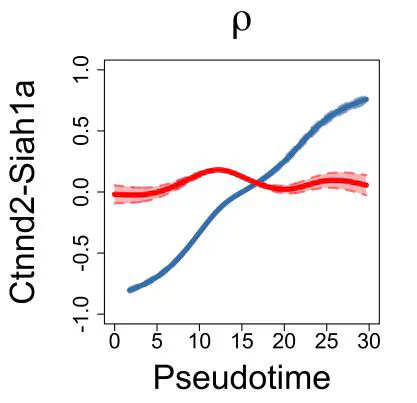Time-coexpress: temporal trajectory modeling of dynamic gene co-expression patterns using single-cell transcriptomics data

Abstract
The rapid advancement of single-cell RNA sequencing (scRNAseq) technology provides high-resolution views of transcriptomic activity within individual cells. Most routine analyses of scRNAseq data focus on individual genes; however, the one-gene-at-a-time analysis is likely to miss meaningful genetic interactions. Gene co-expression analysis addresses this limitation by identifying coordinated changes in gene expression in response to cellular conditions, such as developmental or temporal trajectories. Existing approaches to gene co-expression analysis often assume restrictive linear relationships. However, gene co-expression can change in complex, non-linear ways, which suggests the need for more flexible and accurate methods. We propose a copula-based framework, TIME-CoExpress, with proper data driven smoothing functions to model non-linear changes in gene co-expression along cellular temporal trajectories. Our method provides the flexibility to incorporate characteristics commonly observed in scRNAseq data, such as over-dispersion and zero-inflation, into the modeling framework. In addition to modeling gene co-expression, TIME-CoExpress captures dynamic changes in gene-level zero-inflation rates and mean expression levels, providing a more comprehensive analysis of scRNAseq data. Through a series of simulation analyses, we evaluated the performance of the proposed approach. We further demonstrated its implementation using a scRNAseq dataset and identified differentially co-expressed gene pairs along the cellular temporal trajectory during pituitary embryonic development, comparing Nxn−/ and wild-type mice. The proposed framework enables flexible and robust identification of dynamic, non-linear changes in gene co-expression, zero-inflation rates, and mean expression levels along temporal trajectories in scRNAseq data. Detecting these changes provides deeper insights into the biological processes and offers a better understanding of gene regulation throughout cellular development.
Type
Publication
BMC Bioinformatics, 26, 199